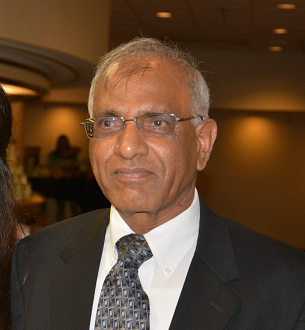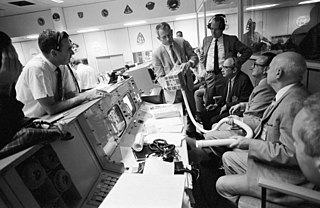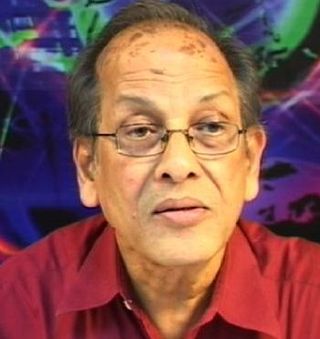
Indian Institute of Technology Kharagpur is a public institute of technology and research university an autonomous institute, established by the Government of India in Kharagpur, West Bengal. Established in 1951, the institute is the first of the IITs to be established and is recognised as an Institute of National Importance. In 2019 it was awarded the status of Institute of Eminence by the Government of India. IIT Kharagpur is ranked among the most prestigious academic institutions in India.
Applied mechanics is the branch of science concerned with the motion of any substance that can be experienced or perceived by humans without the help of instruments. In short, when mechanics concepts surpass being theoretical and are applied and executed, general mechanics becomes applied mechanics. It is this stark difference that makes applied mechanics an essential understanding for practical everyday life. It has numerous applications in a wide variety of fields and disciplines, including but not limited to structural engineering, astronomy, oceanography, meteorology, hydraulics, mechanical engineering, aerospace engineering, nanotechnology, structural design, earthquake engineering, fluid dynamics, planetary sciences, and other life sciences. Connecting research between numerous disciplines, applied mechanics plays an important role in both science and engineering.
Kalyanmoy Deb is an Indian computer scientist. Deb is the Herman E. & Ruth J. Koenig Endowed Chair Professor in the Department of Electrical and Computing Engineering at Michigan State University. Deb is also a professor in the Department of Computer Science and Engineering and the Department of Mechanical Engineering at Michigan State University.
Hassan Aref, was the Reynolds Metals Professor in the Department of Engineering Science and Mechanics at Virginia Tech, and the Niels Bohr Visiting Professor at the Technical University of Denmark.

Thomas Joseph Robert Hughes is a Professor of Aerospace Engineering and Engineering Mechanics and currently holds the Computational and Applied Mathematics Chair (III) at the Oden Institute at The University of Texas at Austin. Hughes has been listed as an ISI Highly Cited Author in Engineering by the ISI Web of Knowledge, Thomson Scientific Company.

Niranjan Krishna Nayak is an Indian aerospace engineer and Professor Emeritus at Indian Institute of Technology Bombay. He is known for his research work on thermomechanical behavior of textile composites and ballistic impact, low velocity impact, fatigue and fracture of composites. His special interest is also on science and technology of aircraft production. Major awards and recognitions conferred to him are: Fellowship of the National Academy of Sciences, India (2004); Fellowship of the Indian National Academy of Engineering (2005); Professor H. H. Mathur Award for "Excellence in Research in Applied Sciences 2006" by IIT Bombay; "Excellence in Aerospace Education Award 2008" by the Aeronautical Society of India; Aerospace Engineering Division Gold Medal of the Institution of Engineers (India) for the year 1992-93 for his research on polymer matrix composites and "Shri Hotchand M. Lala and Shrimati Jamuna H. Lala Excellence in Teaching Award, 2013" by IIT Bombay.
Satya Atluri was an Indian American engineer, educator, researcher and scientist in aerospace engineering, mechanical engineering and computational sciences, who was a Distinguished Professor Emeritus of Aerospace Engineering at the University of California, Irvine. Since 1966, he made fundamental contributions to the development of finite element methods, boundary element methods, Messless Local Petrov-Galerkin (MLPG) methods, Fragile Points Methods, Local Variational Iteration Methods, for general problems of engineering, solid mechanics, fluid dynamics, heat transfer, flexoelectricity, ferromagnetics, gradient and nonlocal theories, nonlinear dynamics, shell theories, micromechanics of materials, structural integrity and damage tolerance, Orbital mechanics, Astrodynamics, digital Twins of Aerospace Systems, etc.

Junuthula N. Reddy is a Distinguished Professor, Regent's Professor, and inaugural holder of the Oscar S. Wyatt Endowed Chair in Mechanical Engineering at Texas A&M University, College Station, Texas, USA.[1] He is an authoritative figure in the broad area of mechanics and one of the researchers responsible for the development of the Finite Element Method (FEM). He has made significant seminal contributions in the areas of finite element method, plate theory, solid mechanics, variational methods, mechanics of composites, functionally graded materials, fracture mechanics, plasticity, biomechanics, classical and non-Newtonian fluid mechanics, and applied functional analysis. Reddy has over 620 journal papers and 20 books and has given numerous national and international talks. He served as a member of the International Advisory Committee at ICTACEM, in 2001 and keynote addressing in 2014.[2][3]

Aerospace engineering is the primary field of engineering concerned with the development of aircraft and spacecraft. It has two major and overlapping branches: aeronautical engineering and astronautical engineering. Avionics engineering is similar, but deals with the electronics side of aerospace engineering.
The Indian Institutes of Technology (IITs) are a network of engineering and technology institutions in India. Established in 1950, they are under the purview of the Ministry of Education of the Indian Government and are governed by the Institutes of Technology Act, 1961. The Act refers to them as Institutes of National Importance and lays down their powers, duties, and framework for governance as the country's premier institutions in the field of technology. 23 IITs currently fall under the tenor of this act. Each IIT operates autonomously and is linked to others through a common council called the IIT Council, which oversees their administration. The Minister of Education of India is the ex officio chairperson of the IIT Council.

Narinder Kumar Gupta is a research scientist, educator, and engineer. Born 22 August 1942 in Mirpur, Jammu and Kashmir, India, is Professor of Mechanics at the Indian Institute of Technology in Delhi. Gupta works in the area of large deformations of metals and composites at low, medium and high rates of loading. His research stimulates the development of constitutive behaviour of materials, understanding of the basic mechanics of large deformation, design for crashworthiness of road and air vehicles, design for safety in defence applications and in design of metal forming processes.
Rama Govindarajan is an Indian scientist specialized in the field of fluid dynamics. She previously worked at the Engineering Mechanics Unit of the Jawaharlal Nehru Centre for Advanced Scientific Research from 1998 to 2012 and as a professor at the TIFR Hyderabad Centre for Interdisciplinary Sciences from 2012 to 2016. As of 2019 she is working as a professor at International Centre for Theoretical Sciences (ICTS), Bengaluru. Govindarajan is a recipient of the Shanti Swarup Bhatnagar Award for the year 2007.
Sanghamitra Bandyopadhyay is an Indian scientist specializing in computational biology. A professor at the Indian Statistical Institute, Kolkata, she is a Shanti Swarup Bhatnagar Prize winner in Engineering Science for 2010, IInfosys Prize 2017 laureate in the Engineering and Computer Science category and TWAS Prize winner for Engineering Sciences in 2018. Her research is mainly in the areas of evolutionary computation, pattern recognition, machine learning and bioinformatics. Since 1 August 2015, she has been the Director of the Indian Statistical Institute, and she would oversee the functioning of all five centres of Indian Statistical Institute located at Kolkata, Bangalore, Delhi, Chennai, and Tezpur besides several other Statistical Quality Control & Operation Research Units spread across India. She is the first woman Director of the Indian Statistical Institute. Currently she is on the Prime Ministers' Science, Technology and Innovation Advisory Council. In 2022 she was given the Padma Shri award for Science and Engineering by the Government of India.

Tarun Kant, an institute chair professor at the Indian Institute of Technology Bombay in Mumbai since December 2009, was born on 1 July 1946 in Ballia, Uttar Pradesh, India. He received a BSc degree from Allahabad University in 1962, a B.Tech (Hons.) degree in civil engineering from IIT Bombay in 1967 and an M.Tech in civil engineering, specializing in structural engineering, from the Indian Institute of Technology Kanpur in 1969. Kant spent about 18 months at a consulting engineering firm in Mumbai before becoming a lecturer at IIT Bombay in January 1971. He received a PhD degree in 1977. Kant became an assistant professor in 1978 and a professor in 1986. At IIT Bombay, he has been a department head (2000–2002), dean of planning (2001–2003) and chair of the Joint Entrance Examination (1998) and the Central Library (1995–1999).

Bhrigu Nath Singh, also known as B.N. Singh, is an Indian engineering scientist and the director general at the IITRAM. He is a distinguished professor, former HAL chair professor and Institute's first Dean of Human Resources(2016-2020), Indian Institute of Technology Kharagpur. Chair of the ICTACEM and former Head of Department Aerospace Engineering, IIT Kharagpur.
Gangan Prathap is an Indian scientist/engineer specialising in structural mechanics, composite material, finite elements and information science. After his graduation in Aerospace Engineering from IIT Madras, he was with National Aerospace Laboratories, Bangalore, for about twenty years serving the laboratory as scientist at several levels. In April 2000, he took over as Scientist-in-Charge, CSIR Centre for Mathematical Modelling and Computer Simulation and held that position till January 2008. He had also served as the Vice-Chancellor, Cochin University of Science and Technology, for a short period from February 2008 to February 2009. After leaving CUSAT, Prathap took charge as director of National Institute of Science Communication and Information Resources (NISCAIR), and continued in that position till his retirement on superannuation from government service. Since August 2013, he has held the position of Outstanding Scientist at National Institute for Interdisciplinary Science and Technology (NIIST), Thiruvananthapuram. He is also an Honorary Professor of A P J Abdul Kalam Technological University.

Lallit Anand is the Warren and Towneley Rohsenow Professor of Mechanical Engineering at the Massachusetts Institute of Technology (MIT). His research focuses on solid mechanics and large deformation plasticity theory. He has received numerous awards and accolades for his significant contributions to the field of applied mechanics and mechanical engineering.
Amitabha Ghosh is an Indian researcher, administrator and educator. He currently holds the position of Honorary Scientist, Indian National Science Academy and Honorary Distinguished Professor in the Aerospace Engineering and Applied Mechanics Department at the Indian Institute of Engineering Science and Technology, Shibpur, Howrah, West Bengal. He is an Emeritus Senior Fellow of the Alexander von Humboldt Foundation and a Fellow of The National Academy of Sciences, India, of which he was elected a Senior Scientist Platinum Jubilee Fellow in 2012. Ghosh has made contributions in various fields, including fundamental and applied research, technology development, administration and social development.

Somnath Ghosh is the Michael G. Callas Chair Professor in the Department of Civil & Systems Engineering and a Professor of Mechanical Engineering and Materials Science & Engineering at Johns Hopkins University (JHU). He is the founding director of the JHU Center for Integrated Structure-Materials Modeling and Simulation (CISMMS) and was the director of an Air Force Center of Excellence in Integrated Materials Modeling (CEIMM). Prior to his appointment at JHU, Ghosh was the John B. Nordholt Professor of Mechanical Engineering and Materials Science & Engineering at Ohio State University. He is a fellow of several professional societies, including the American Association for the Advancement of Science (AAAS).

Supriyo Bandyopadhyay is an Indian-born American electrical engineer, academic and researcher. He is Commonwealth Professor of Electrical and Computer Engineering at Virginia Commonwealth University, where he directs the Quantum Device Laboratory.










